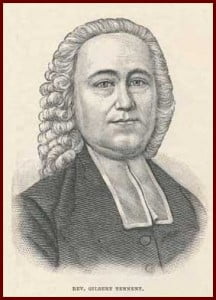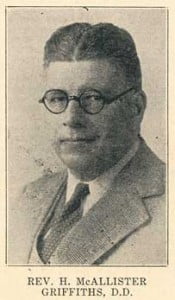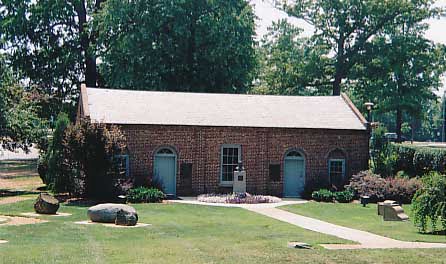Warrior Presbytery Leaves the Southern Presbyterian Church
[text from an article in The Southern Presbyterian, vol. 1, no. 2 (February 1973):
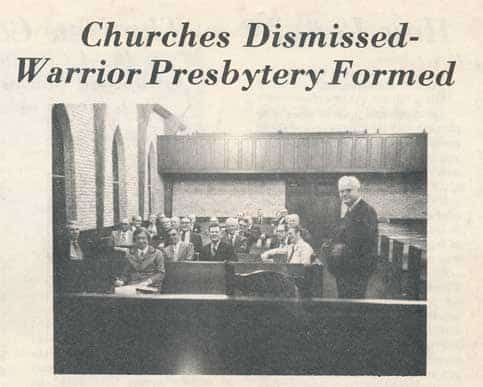 Twenty-one churches and five ministers were dismissed, at their own request, from Tuscaloosa Presbytery (PCUS), on Tuesday, February 13, 1973 at Linden, Alabama. The Presbytery included the phrase “with their property” in each of the actions. It also passed a legally worded “quit claim” to cover all the churches dismissed. The congregations of these churches had voted to request this, most of them unanimously. The parent group is the Presbyterian Church in the United States, formed in Augusta, Georgia in 1861.
Twenty-one churches and five ministers were dismissed, at their own request, from Tuscaloosa Presbytery (PCUS), on Tuesday, February 13, 1973 at Linden, Alabama. The Presbytery included the phrase “with their property” in each of the actions. It also passed a legally worded “quit claim” to cover all the churches dismissed. The congregations of these churches had voted to request this, most of them unanimously. The parent group is the Presbyterian Church in the United States, formed in Augusta, Georgia in 1861.
 The Presbytery Meeting was, for the most part, congenial and quiet. There was a spirit of understanding and of helpfulness among the men of opposing sides. At the close, several shook hands and expressed Christian love for one another and wished the blessings of God upon the other. The Moderator of this meeting was a revered minister of the Presbytery who had recently retired, Rev. John Preston Simmons of Aliceville. His prayers and general spirit were used by God to bring about this separation in relative peace and clam.
The Presbytery Meeting was, for the most part, congenial and quiet. There was a spirit of understanding and of helpfulness among the men of opposing sides. At the close, several shook hands and expressed Christian love for one another and wished the blessings of God upon the other. The Moderator of this meeting was a revered minister of the Presbytery who had recently retired, Rev. John Preston Simmons of Aliceville. His prayers and general spirit were used by God to bring about this separation in relative peace and clam.
Only one church and minister were disappointed. Although they were dismissed, the action was contested by a complaint addressed to Synod and will have to be settled before the action can become effective (under the rule that one-third of the members of Presbytery supported the complaint).
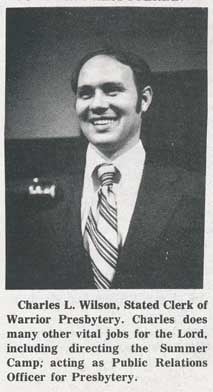 This is action is parallel to that which brought into being the first Presbytery in the Continuing Presbyterian Church, Vanguard Presbytery. The new Presbytery in West Alabama will be named Warrior because most of the churches are in or near the basin of the Black Warrior river.
This is action is parallel to that which brought into being the first Presbytery in the Continuing Presbyterian Church, Vanguard Presbytery. The new Presbytery in West Alabama will be named Warrior because most of the churches are in or near the basin of the Black Warrior river.
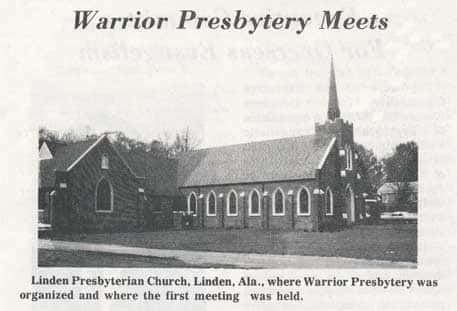 Ministers and Churches of this new Presbytery include William C. Dinwiddie, pastor of Greensboro, Akron, and Newbern; Virgil Pino, pastor of Uniontown, Gastonburg, and Faunsdale; Willard W. Scott, pastor of Brent; Cecil Williamson, Jr., pastor of Crescent Hill and Valley Creek; and Charles L. Wilson, pastor of Aliceville and Pleasant Ridge. The following churches are at present without a pastor : Cedar Grove (Epes), Coatopa, Emelle (pastoral relation was severed at the time of dismissal), Gainesville, Geneva, Myrtlewood, Sumterville (Bethel I), Oxford, Linden and York. The action which was suspended by the complaint involved Woodland Heights Church and William H. Rose, pastor.
Ministers and Churches of this new Presbytery include William C. Dinwiddie, pastor of Greensboro, Akron, and Newbern; Virgil Pino, pastor of Uniontown, Gastonburg, and Faunsdale; Willard W. Scott, pastor of Brent; Cecil Williamson, Jr., pastor of Crescent Hill and Valley Creek; and Charles L. Wilson, pastor of Aliceville and Pleasant Ridge. The following churches are at present without a pastor : Cedar Grove (Epes), Coatopa, Emelle (pastoral relation was severed at the time of dismissal), Gainesville, Geneva, Myrtlewood, Sumterville (Bethel I), Oxford, Linden and York. The action which was suspended by the complaint involved Woodland Heights Church and William H. Rose, pastor.
This is the action for which much prayer has been made. The men insist that this is a positive action intended to preserve Biblical Faith and Presbyterian Order. It is a part of a much larger move planned by many churches and ministers across the South under the leadership of four organizations of conservative churchmen.
Words to Live By: Division is always something to be entered into with great trepidation. Schism can be defined as a sinful, prideful division. But there is a division that truth itself requires. Jeremiah Burroughs, a Puritan especially noted for his efforts at healing divisions, said that “It is not enough that we are one, unless we are one in Christ” and “The division that comes by truth is better than the union that comes by error.” The measure of a biblical separation will always be one where there is brokenness over our own sins as well as over the sins of the Church, when staying would require us to sin.

